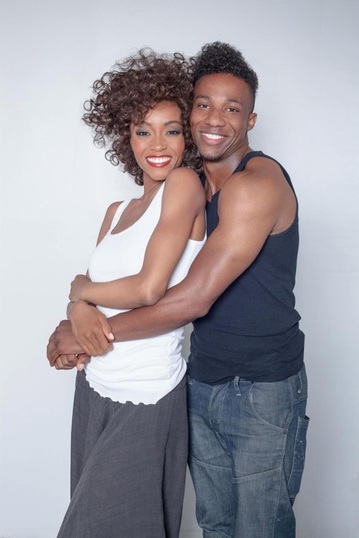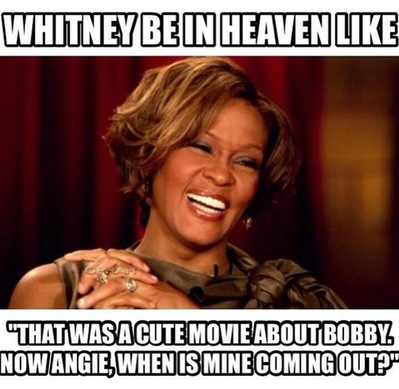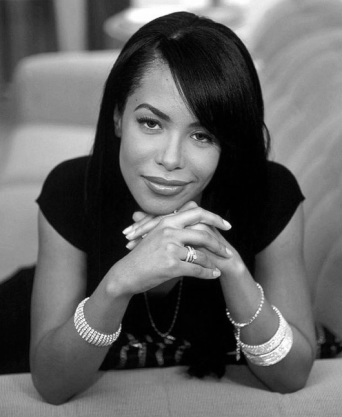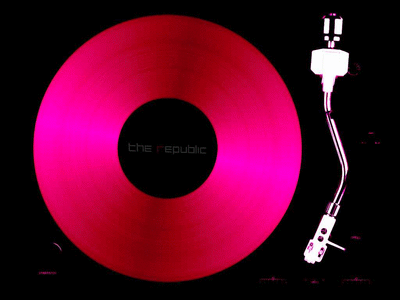 (L-R) DaCosta & Escarpeta as Whitney & Bobby
(L-R) DaCosta & Escarpeta as Whitney & Bobby By Jamaal D. Pittman, Contributing Writer
So I’m in the mood for a little nostalgia. Remember What’s Love Got to Do With It?, the story of Ike Turner’s descent into drug addiction during his tumultuous marriage to superstar Tina Turner? No? Well, how about Ray, the big-screen story of Margie Hendricks’ desperate attempt to convince the title character to finally abandon his womanizing ways and let true love guide him? Still no? I didn’t think so. Me neither, which makes it even more jarring that the protagonist in Lifetime’s Whitney plays a supporting, but throwaway, role. I could be wrong, but I believe this is the first biopic where the titular character is the least dynamic and interesting and I’m counting day players. We learn a lot (more) about Bobby Brown, his children and his dreams for the future. The film goes on to chronicle his struggle to cope with Whitney’s success, the death of his long-time friend and how desperate he (allegedly) was to conquer his drug and alcohol addiction.
In contrast, we learned the following: Whitney was talented. She had trust issues. She loved Bobby. And she loved her coke. All things that we gathered prior to her untimely death in 2012. Everything else went unanswered. Like, what made her turn to drugs, why was Bobby such a magnet for her and why did she struggle so much with her de facto role as ‘America’s sweetheart’? If we took the film’s screenplay as the gospel truth, then the theme of this movie can be summed up quickly: Bobby Brown was a victim of his demons. And Whitney Houston, intentionally or not, was the demon. Whether or not the story was based on fact or fiction, a viewer could easily walk away from this movie feeling more sympathetic to Bobby’s plight (that is, if you can call being married to and loved by Whitney Houston a plight). Kim is pregnant: poor Bobby, Whitney should have hung on to him. Clive wants to meet with Bobby, not for a record deal, but to discuss Whitney going on tour: poor Bobby, Clive should have known better than to use him as a pawn. Bobby is now married to the biggest music star in the world: he can no longer be a philandering alcoholic, that poor, poor Bobby.
There are a few strong scenes in the movie, but the holes in the portrayals, like Alex Forrest in Fatal Attraction, refuse to be ignored. In the opening scene, model-turned-actress Yaya DaCosta says “Time to be Whitney Houston,” but two hours later and post-credits, we realized we were duped by an unrevealed spoiler: she would never deliver on that statement. I was on the film’s set the day the Soul Train performance scenes of Whitney and Bobby were shot and I walked away with one conclusion: while DaCosta’s on-stage scenes as Whitney would be spot on, her off-stage scenes would lack the weight, prowess and believability needed to make this film and role work. Unfortunately, the opposite turned out to be true when viewing the entire film in context. In spite of her best efforts and several powerhouse scenes, DaCosta delivers too inconsistent a performance to be completely convincing as the larger-than-life Houston. Then again, given the divergent facets of Houston’s persona, it could be written off as simply a strong acting choice instead of a blatant lack of character study. In a few scenes, it seemed as if DaCosta had spent years researching Houston for this moment; in others, it was as though she were handed the script mere seconds before the slate was read. It was in one fleeting scene, by the pool with friend Robyn Crawford (played by Yolanda Ross), that she finally seemed to rise to the occasion. In this singular moment, she recognizes the tall order before her, channeling Whitney’s speech patterns, tone and inflections to seemingly eerie precision, but alas, sustainability was not in the cards.
I am convinced that DaCosta saved the heavy lifting for the dramatic dialogue of the confrontation scenes and not much time was allotted to making sure the lip-synching and movements were true to Houston’s on-stage presence. In fact, in some parts, the lip-synching was glaringly amateurish. Even more than that, the unnecessary overworking of Houston’s stage mannerisms was a distraction. While the real-life Whitney sweated profusely from time to time, even in her most energetic performances and at her most vocally vulnerable, she never seemed to be “working” for it. She belted out her numbers with cool confidence and with none of the facial strain and tension that her big-voiced contemporaries were employing. Whether she was singing “I Will Always Love You” or “How Will I Know,” she had a relaxed disposition that made it all seem so effortless. Arlen Escarpeta did a decent job as Bobby Brown, but here’s a little tidbit that the people who weren’t on set don’t know: he seemed incredibly uncomfortable performing as Brown during “Every Little Step.” The gentlemen who was his body double looked, moved and acted at ease and way more Bobby-esque than Escarpeta ever did. Double-Bobby had the crowd mesmerized, eating out of the palm of his hand and wondering why he wasn’t cast as Bobby. However, I do believe that Escarpeta has chops as an actor and deserves a better showcase for his talent. He was just cast in the wrong film.
 I know, right?
I know, right? I won’t delve too much into the major factual errors in this film--like not only was Whitney not a performer at the Soul Train awards that night, but was booed by the audience during the nominee roll call for being ‘too pop’ --but I have to address the missed opportunity that came with its omission. Whitney’s rejection by the African-American audience at that time undoubtedly affected her psyche and could’ve theoretically factored into her attraction to Bobby Brown, R&B’s then-leading man. An accurate exploration of this pivotal moment could have made for a much more compelling film.
While I thought the casting of Ross as Crawford was indisputably inspired, I disagreed with the reduction of her role to, dare I say it, a supportive ‘mammy’ figure, voice of reason and a sage. People have speculated for years about the extent of their relationship (there were rumors of romantic involvement). I won’t jump into that debate, but one thing can be said for sure: it had to have been more meaningful than the overdone, know-it-all best friend archetype. The actress gave a strong presentation, despite the limitations of the script and Crawford warranted more. Additionally, the inclusions of Mark Rolston as Clive Davis and Suzzanne Douglass as Cissy Houston were a treat. Douglass has always been a strong and dependable actress, and this time was no exception. In particular, her reaction to Whitney’s engagement was a highlight.
So what’s my overall feeling of the film? Despite some good performances and a few memorable moments, this film was largely uneven. The good news: It was much better than the Wendy Williams-produced Aaliyah debacle that preceded it. The bad news: it wasn’t nearly as well done as it should have been, and that’s disappointing, given that Houston’s story is a treasure trove of great material to work with. Years later, we’re still trying to reconcile the crossover marketing campaign of the 1980s and 1990s with the drug-focused bad press of the last few years of her life, and how that dichotomy ultimately helped to destroy her. Here’s hoping the inevitable big-screen version will get it right.
J.Says’ Perspective:
I agree with 99.9% of Jamaal’s review. The movie should’ve been titled Bobby Brown: Misunderstood Angel, as majority of it displayed his point-of-view: his private thoughts and social interactions, and painted the picture that all of his vices and poor choices were the result of being married to Whitney. Did they really expect us to believe that he started drinking after an awkward meeting with Clive Davis? He himself has said his alcoholism ignited prior to marrying Houston. Houston stated in her last interview with Oprah Winfrey that she did a little bit of cocaine pre-Bodyguard and began heavier use after (this was supported by Brown), but she was doing a line every other scene. Meanwhile, Brown was seen doing it only twice. Also, how convenient was it that the biopic ended around the Bodyguard tour, before Brown’s nearly-annual arrests (causes included DUI’s, drug possession, child support violations and abuse claims) and him spitting in her face (as described by Houston with Oprah)? I already found it exploitive and disturbing that Houston’s former cast-mate and (so-called) pal, Angela Bassett, would direct a film centralized on the most publicized aspect of her life, so it didn’t help that the project seemed to have a very slanted, white-washed perspective. If anything, Houston and Brown were equally flawed. Was Bassett Whitney’s or Bobby’s friend? I’m confused. The ending credits were laughable, going on about her accomplishments as if the movie were actually about her or her career. As for DaCosta; I didn’t feel Whitney, really. There was such a disconnect for me that I couldn’t picture Whitney in the scenarios depicted. It wasn’t like Jennifer Lopez in Selena or Jamie Foxx in Ray, where you forget you’re looking at Lopez and Foxx. She also played it too sweet and girlish. The movie was called Whitney, but I didn’t see her anywhere. I searched high, low and just around the river bend. How unnecessarily over-the-top was the first sex scene, by the way? I saw hands going down underwear and stroking. That was too much, too wide and didn’t fit. Whitney was such a weird, alternate, sometimes SNL spoof -like universe, that when Lifetime aired live show clips after, it was refreshing. It was refreshing to see HER actual face and hear HER actual voice. Now, that was Whitney. Jamaal titled this “Not Right, Just Okay,” but “Not Right, Not Okay” wouldn’t have been unfair.



 RSS Feed
RSS Feed